Student Profiles
Oxford University seeks to attract the best and brightest students. It's accessible to all students of talent and ability, irrespective of background. Below are some profiles of current (and recent) undergraduate students taking Computer Science.
You can find out more about members of the Department, including tutors and lecturers, here. You can also read up on why our current students chose Oxford to study Computer Science, and about their experiences of the application process. Students talk about their summer internship experiences here.
You can chat with some of our students through College websites: Christ Church , Exeter College, Keble College, Lincoln College, Magdalen College , Somerville College .
Monim
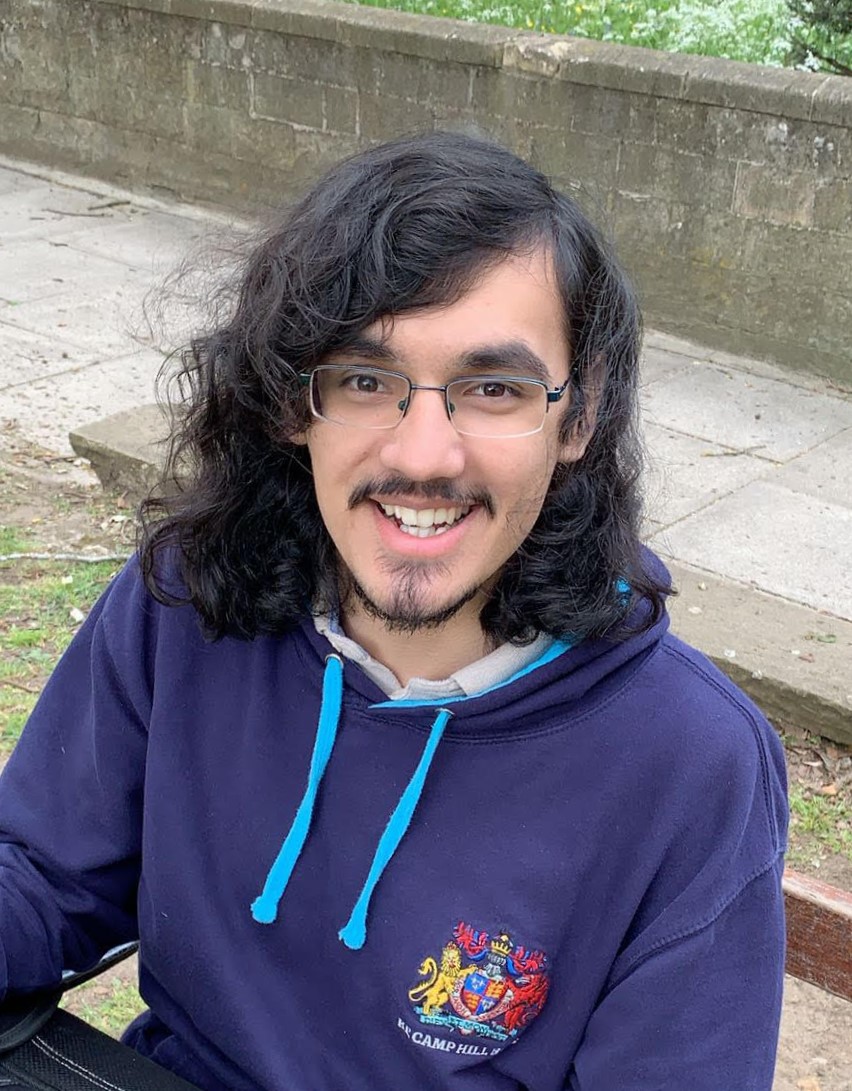 Monim
Monim
Computer Science and Philosophy
Oriel College
What is the best thing about studying your subject at your college?
Oriel is a beautiful college, small in size, and it feels like a great community. Because of the way the course is structured, you end up having two groups of people to work with. Your Computer Science tutorials will be with all the computer scientists, but the philosophy tutorials will be with the philosophers. Having that mix of people throughout the year has been really fun.
Plus, there is lots of mixing between subjects because Oriel’s community is so close. Your friends besides work are going to be doing all kinds of things, and you will too! An online newspaper, non-contact ice hockey and regular (college-organised!) tea and toast are all highlights of my time.
What advice would you give prospective applicants for your course?
This is a brilliant subject which exercises all parts of your brain. Brush up on your Maths for Computer Science, and think deeply about the philosophy that you’ve read. In both cases, understanding what you know matters more than how much you know.
Programming in your spare time is just a fun thing to do anyway, so I would recommend that as practice. But remember that as a computer scientist, you should be thinking about programming more than writing code. Whenever you come across an interesting new feature or technique, look it up to see how it works. Dive into the areas of the subject that interest you most (YouTube videos are often just as good as books!)
For the philosophy, don’t worry if it’s a new subject for you, though I would recommend looking up an area that you find interesting to think about. See if you can break down the arguments you are reading into each little claim that is being made. Often, something won’t fit right, and that’s what you go for! Philosophy is a skill that you develop over time, and it’s a way of thinking that you can apply everywhere in your life. See if you can start to think about your issues in a systematic way. What are your assumptions? What is your reasoning? Does it really get you your conclusion? Logical reasoning is the core.
Monim also has a profile on Oriel College's website.
Eleanor
Maths and Computer Science
University College
Ellie talks about an average day in her life as an undergraduate studying Maths and Computer Science at Oxford.
Dylan
Computer Science and Philosophy
Hertford College
Dylan talks about his experience applying to study Computer Science and Philosophy at the University of Oxford.
Anna
Computer Science and Philosophy
Hertford College
I have been studying for an undergraduate degree in Computer Science and Philosophy since 2016. I chose this course because of an interest in artificial intelligence and logic, but I have discovered so many more areas that I love within the degree, from functional programming to ethics. I like the combination of working on computer science problem sheets and philosophy essays, and the opportunity Oxford offers to have tutorials on both. Oxford has definitely challenged me academically and I'm so proud of the work I’ve done on my course so far.
I was worried whilst preparing for the MAT test and interview process, but once I got to Oxford for interview, I found I actually enjoyed getting to tackle interesting logic problems and philosophical conundrums with the tutors. For anyone unsure about this process, I would encourage you to work hard on your maths in preparation, as that will put you in the best position to get in, and help you figure out whether you'll enjoy the challenges at Oxford.
Outside academic work, I've found Oxford to be a vibrant (and hectic!) place to be. There's always an interesting talk happening at the Oxford Union, a sport match or a theatre production to participate in or watch, and a historically-significant pub to go to with friends. I'm part of the Oxford Women in Computer Science society and the Oxford University Filmmaking Foundation.
Maninder
Computer Science
University College
You can find more of Maninder's videos here.
Alice
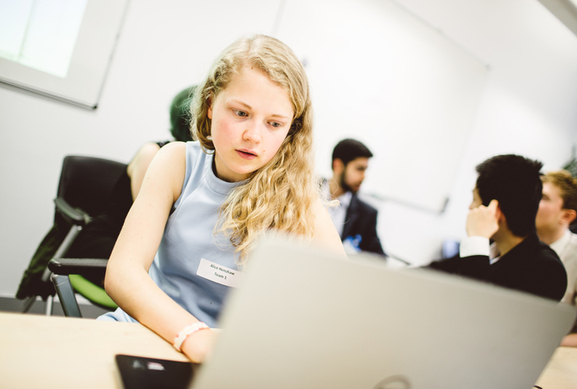 Alice
Alice
Computer Science
Balliol College
What is the best thing about studying Computer Science at Balliol?
Balliol has got both incredible computer science tutors, who've taught me so much of what I know over the last 3 years, and also one of the most welcoming atmospheres among students I've ever come across. Coming to Balliol I was nervous about the prospect of making new friends alongside having a large amount of work to do, but the tutors and other students all made this transition incredibly easy. The tutors are always willing to organise extra sessions outside of tutorials if you need it, and every student in the college is unbelievably friendly and welcoming. I was especially surprised by how sociable the other students in college are, as that isn't the reputation that Oxford and Computer Science often have – so please don't let those stereotypes put you off.
What advice would you give prospective applicants for your course?
Make sure you're not looking to do a large amount of practical programming. At Oxford, we do programming but we also study the theory of Computer Science. I personally find that learning the theoretical side to the subject helps massively when it comes to writing efficient and well-constructed programs, however if what you are after is a degree focused on programming, then Oxford may not be the place for you.
Matthew
Mathematics & Computer Science
Balliol College
What is the best thing about studying Maths & Computer Science at Balliol?
When I was applying to study Mathematics and Computer Science, I was worried that I might feel a little bit out of place in both departments. At Balliol, this is certainly not the case. Everyone is very friendly and welcoming. What's more, most of the in-college social events for the departments are actually run jointly for mathematicians and computer scientists anyway.
The tutors at Balliol are incredibly helpful - the subjects are both challenging, but the tutors do an excellent job of highlighting important material and explaining it a way that makes it easier to understand.
In my opinion, the subject choice gives you the best of both worlds. On the maths side, you get to do all of the pure maths modules and only miss out on the applied maths modules. On the computing side, you do the theoretical and programming modules and don't do the more practical modules. In later years, you get more choice in the modules you do so when you find out which you're more interested in, you can choose to focus on it.
I've always loved both maths and computing, and doing these courses at Balliol is an excellent way to explore these subjects in great detail.
What advice would you give prospective applicants for your course?
If you can't decide whether to do maths or computer science, just do both! The combined course is great fun and gives you a broader knowledge than doing just one of the two.
Tiffany
Computer Science & Philosophy
Balliol College
What is the best thing about studying Computer Science & Philosophy at Balliol?
Although I am the only person in my year studying Computer Science and Philosophy at Balliol, I have not had any trouble meeting new people and forming close friendships with many people here, as well as being able to meet the others on my course that are at different colleges. One great thing about being on such a small course overall, is that everyone knows each other. On the flip side, that does mean that most people have never heard of the course at all, but getting past the 'but how exactly does your degree work together?' questions in Freshers' Week was definitely a worthwhile challenge, as I have thoroughly enjoyed spending time here at Balliol, studying Computer Science and Philosophy.
The tutors are really great and approachable, and do an amazing job of patching up our understanding when understanding the week's material didn't go that well, and the informal atmosphere avoids making things as awkward as you might expect, with two students face-to-face with a leading researcher.
The best aspect of the course is probably that both halves are so different (and yet also very interconnected), so I can 'take a break' from trying to figure out how Oberon (an obscure programming language we use in second term) works, and instead question whether I would survive being teleported to Mars.
What advice would you give prospective applicants for your course?
The main thing I would recommend to do is to try reading about parts of philosophy that seem particularly interesting to you - I chose to focus on Turing since his work relates to both Computer Science and Philosophy. It's also worth trying your hand at some coding to get a feel for what parts of the course will be like. I had never really studied philosophy before getting here, and didn't have a great deal of experience with programming, but that has not been an issue at all since no lectures or courses presume prior knowledge.
Kai
Maths and Computer Science
St John's College
Maria
 Maria Mateescu
Computer Science
Maria Mateescu
Computer Science
Magdalen College
I come from Romania where I studied at Colegiul National "Emil Racovita" Iasi. I took the Romanian Bacalaureate where I achieved 92.4% of the 80% required. I knew I wanted to study Computer Science rather early on.
I think the most fantastic thing for me about the course is the focus on theoretical knowledge. I loved the Algorithms part above all. There is nothing more exciting than being faced with a puzzle and finding a method to solve it. I am among those Computer Scientists who do not particularly like computers, as in the hardware side. For me it is enough to know that it is a black box which does what I tell it to do.
When it comes to Clubs, Societies etc, Oxford has it all. If it doesn't already have it, you will find enough people to make it. Personally I got involved in all the kind of societies. I ended up playing in a musical organized by the Oxford University Light Entertainment Society; went raiding colleges late in the night with the Assassin's Guild; played various characters in the Oxford University RPG[Role Playing Game] Society games and ended up organizing next year's game; became the Oxford University Computer Society secretary; played Poohsticks on the bridges of Addison's Walk.... There are endless possibilities and the people here are so diverse it is impossible not to find people you enjoy yourself with (as long as you go searching).
Oxford is the perfect place. It is as diverse as London (maybe even more diverse) and the high concentration of students makes it a rather quirky place. Do not be surprised by people in elf attires running around with plastic lightsabers *cough*.
Chris
Computer Science
New College
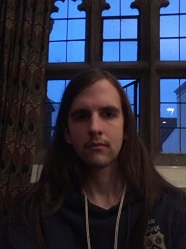 Chris
Before I came to Oxford, I was at Lord Williams's School, an academy school in Thame, England. I did Maths, Further Maths, Physics, and Chemistry over 3 years, since I was recovering from CFS/ME at the beginning of my A-levels. I got A*s in everything but Chemistry, and an A in Chemistry.
Chris
Before I came to Oxford, I was at Lord Williams's School, an academy school in Thame, England. I did Maths, Further Maths, Physics, and Chemistry over 3 years, since I was recovering from CFS/ME at the beginning of my A-levels. I got A*s in everything but Chemistry, and an A in Chemistry.
I chose computing during the process of writing my personal statement -- I wasn't terribly fixed on course (it was between Comp, Maths, and Physics), and basically chose comp because I had some experience programming, I was bad at experimental work, and I wasn't sure I'd like the level of abstraction in Maths.
Now I am at Oxford, I play non-contact ice hockey twice a week. As a non-skater before coming to the university, this took a bit of learning (and a few bruises...) I currently play drums in a ceilidh band and also now band treasurer. I've even learned to play bridge.
Robert
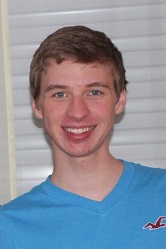 Robert
Computer Science
Robert
Computer Science
Oriel College
I'm German and took my Abitur at a Gymnasium in Germany. My Leistungskurse (advanced subjects) were English and Maths, and my third and fourth subjects were Computer Science and History. My overall grade was 1.2.
I wanted to study either Computer Science or Maths, however, I didn't really like programming. I eventually decided to do Computer Science at Oxford, because the course is very theoretical, includes a lot of maths and there is a wide range of advanced choices in later years. The tutorial system is a really good way to deepen your understanding of the subjects. Whenever you need help, you can just ask the omniscient computer science wizard in your college and they will take the time to explain it to you.
I really enjoyed the Digital Systems course, because it removed the abstraction of programming for me. The course works through how a computer is built starting at transistors and logic gates and eventually reaching a machine that can run code. From what I heard, people are going into a wide range of sectors after graduating, including (of course) software development, but also finance, consulting and many more. I really haven't made my mind up what I want to do yet, but I think this course will be a great preparation for all of them.
Greg
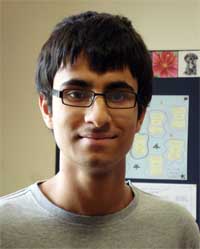 Greg
Computer Science & Philosophy
Greg
Computer Science & Philosophy
St John's College
I previously attended Barton Peveril Sixth Form College in Hampshire, England, studying A-levels in Maths, Further Maths, Physics and Computing, as well as an Extended Project
and Additional Further Maths, Music and Government & Politics at AS level.
Oxford life is fantastically busy with challenging work (but when you enjoy the subject you usually don't mind); socialising (easy when everything and everyone in Oxford is unbelievably close) and taking part in the wealth of extra-curricular fun (currently I'm involved with an orchestra, Christian Union and the Invariants Maths society). As well as the amazing and diverse people and activities that now form my life, I have found the support, teaching and resources provided superb.
